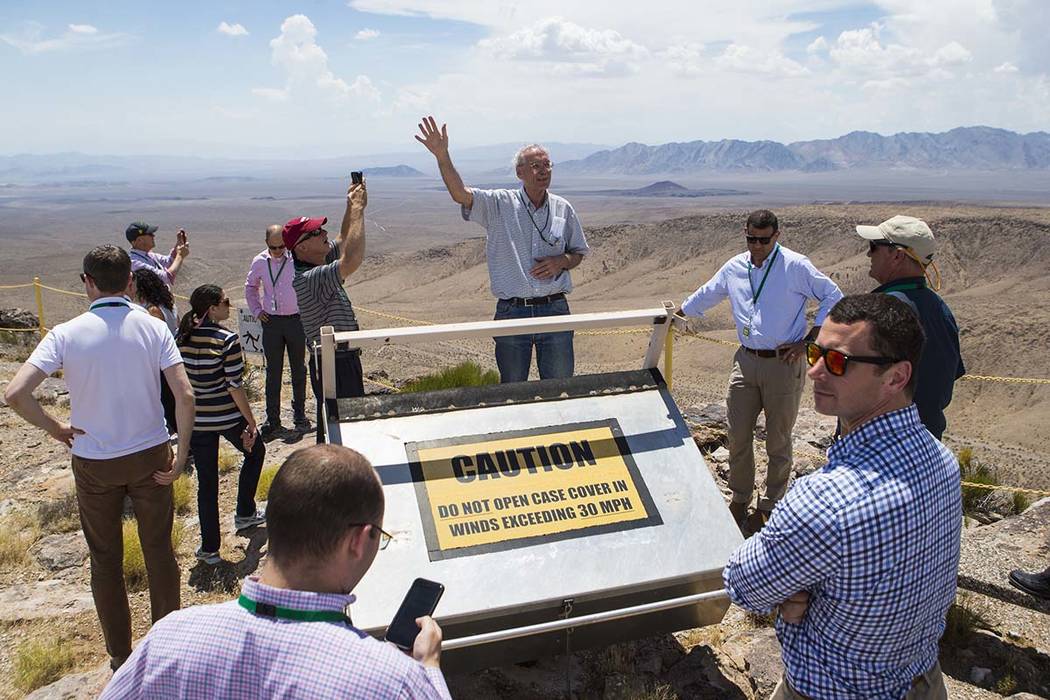
WASHINGTON — A recent congressional tour of Yucca Mountain spurred Las Vegas business leaders to fan out across the nation’s capital days later and lobby lawmakers and the Trump administration against storing nuclear waste in Nevada.
The Las Vegas Metro Chamber of Commerce has historically opposed the Yucca Mountain project, located just 90 miles northwest of the entertainment destination, but a recent visit to the mothballed nuclear waste repository by lawmakers re-ignited worries.
“It stirred up some emotion about it again because it’s something we have been fighting against since its inception,” Mary Beth Sewald, CEO and president of the metro chamber, told the Las Vegas Review-Journal.
Sewald said the congressional tour “reinvigorated everybody’s desire to fight it.”
About 100 business leaders from Las Vegas attended the weeklong trip to Washington last month.
Sewald said tourism is the largest industry in Las Vegas, and business leaders are concerned about safety and the risks of transporting waste through southern Nevada to Yucca Mountain in nearby rural Nye County.
Last month, U.S. Rep. John Shimkus, R-Ill., the chairman of the House Energy and Commerce subcommittee on the environment, led a tour of about a dozen lawmakers to the Yucca Mountain site.
Shimkus is author of a bill to streamline the process to open Yucca Mountain and increase waste storage at the site from 70,000 to 110,000 cubic tons. The House passed the bill 340-72 in May.
The Senate has not taken up legislation on permanent storage, and GOP leadership is unlikely to schedule a vote on legislation to restart the Yucca Mountain process this year to protect U.S. Sen. Dean Heller, R-Nev., the only Republican incumbent running for re-election in a state won by Hillary Clinton in 2016.
Shimkus is frustrated by the lack of Senate action, and the Obama administration’s shelving of the process in 2011 at the behest of then-Senate Majority Leader Harry Reid, D-Nev.
Waste stockpiles growing
By law, the federal government is responsible for taking possession of and storing nuclear waste from power plants, but delays in opening Yucca Mountain have created stockpiles of spent fuel scattered across the country.
Energy Secretary Rick Perry told Congress the government has a moral obligation to take possession and safely store the waste.
But Nevada Gov. Brian Sandoval, a Republican, has led a coordinated state fight against storing the nation’s nuclear waste in Nevada. The state’s congressional delegation is opposed to the Yucca Mountain project, as is a local Native American tribe, the gaming industry and environmental groups.
Nye County and the state’s other rural counties support completion of the licensing process, which would allow the Department of Energy to receive a building permit to construct a storage facility at Yucca Mountain.
Proponents of developing the Yucca Mountain site claim the repository would bring high-paying federal jobs and contracting opportunities that would boost tax revenue for local schools and profits and opportunities for businesses.
Nye County Commissioner Dan Schinhofen, one of the most vocal proponents of Yucca Mountain in Nye County, has said he stands with eight other rural Nevada counties that support vetting the science of Yucca Mountain.
“I am hopeful that at some point our state leaders realize that they should follow the rule of law, listen to the local leaders who are closest to the situation, and that it is unacceptable they are not willing to hear the science and to test their supposed science against technical experts,” he said in comments last week.
Shimkus and other proponents of Yucca Mountain also claim scientific studies show that it is safe for permanent storage of spent fuel rods and other materials used to produce energy at nuclear power plants.
But transporting waste through communities nationwide to Yucca Mountain raises serious concerns because railways pose risk of accidents and are the least secured infrastructure system, said John Hudak, a senior fellow with The Brookings Institution, a Washington-based think tank.
Hudak told Las Vegas business leaders during a panel here that “shipping material from New England to Nevada will be a challenge.”
There have been 17,000 railway accidents since 2010, Hudak said, noting that freight lines in the United States run through population hubs.
Coordinated lobbying tactics
Sewald said Las Vegas business leaders have huddled with the state’s congressional delegation about lobbying tactics.
And business leaders have spoken to other key lawmakers, including U.S. Rep. Bill Shuster, R-Pa., chairman of the House Transportation and Infrastructure Committee, and U.S. Rep. Rob Bishop, R-Utah, the chairman of the House Natural Resources Committee, who voted “no” on the Shimkus bill.
Meanwhile, the state of Nevada has filed more than 200 legal challenges against the DOE license application to build Yucca Mountain, many of which are focused on groundwater concerns. The state also points out that the repository would be in one of the most active seismic regions in the nation.
Hudak said it is doubtful that the Senate will move forward on legislation this year as GOP leadership tries to hold the Nevada Senate seat held by Heller.
If Democrats are successful in taking the House this year, Hudak said, U.S. Rep. Dina Titus, D-Nev., could be instrumental in delaying the process through Democratic leaders to help the party’s presidential nominee in 2020.
President Donald Trump, up for re-election in 2020, is pushing to restart the licensing process to build the Yucca Mountain repository.
The Pahrump Valley Times staff contributed to this story.